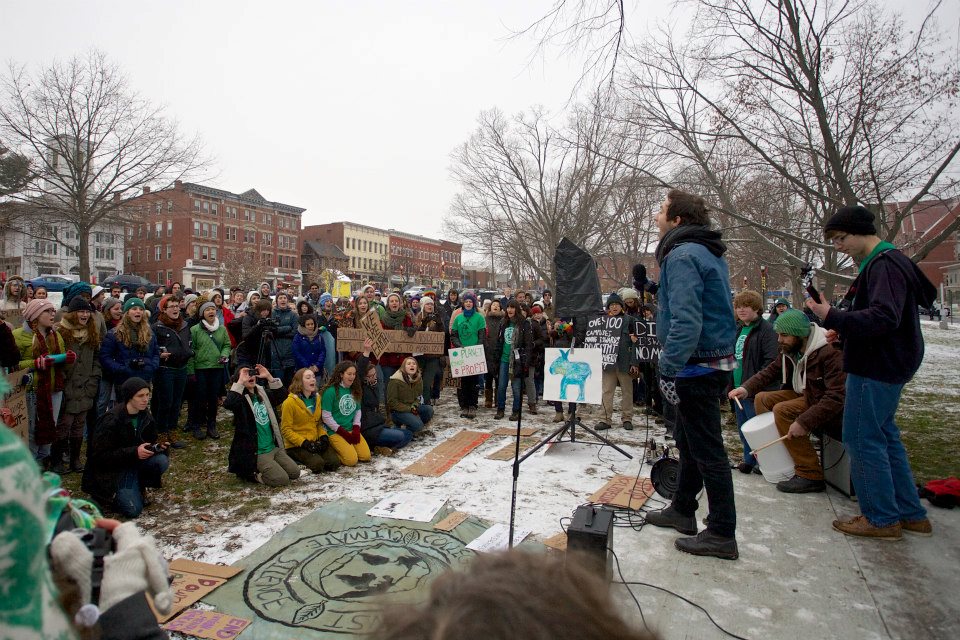

Peter Suechting ’15
Contributing Writer
The first day of December dawned cloudy and cold, though that didn’t discourage over 100 people from participating in the Rally to End Climate Silence that took place on the snow-covered Amherst Town Common. Following a summer of record-breaking temperatures, uncontrollable wildfires and crippling drought, all supplemented by the destructive “superstorm” Sandy, the rally was planned in order to break the climate silence that dominated the entire presidential campaign season, and in many respects, the wider American political landscape.
To that end, students and Pioneer Valley residents brandished signs featuring messages like “fight climate violence, end climate silence,” and “climate change is subsidized, it’s time for us to mobilize,” in an attempt to bring the climate crisis back into the public discourse.
The rally organized by the Hampshire College environmental action student group New Leaf. Emily Keppler, a student leader within New Leaf, mentioned her “frustration and disillusionment with the general capitalism-driven silence” as the starting point of the rally, which originated at a weekly New Leaf planning session. The Hampshire group then took that initial idea to an open Five College meeting at Food for Thought Books, where it found widespread support.
“There is so much energy and power concentrated within the student community of the Pioneer Valley, and we felt that what it needed was a kind of spark or impetus to incite action,” said Keppler, also pointing to the valuable connections student organizers made while planning the rally.
She hopes the connections between the many student environmental groups and local environmental movements will “act as [a] means of collaboration and solidarity in the future.”
The rally featured many different acts, such as a folk duo from Hampshire College singing about the modern poverty of environmental morality and a dance number that had dancers drawing on-lookers, one-by-one, into the center of the dance to show how awareness can spread exponentially through simple, personal interactions.
After the musical and theatrical acts, Craig Altemose, the Executive Director of Better Future Project, an initiative that provides organization, development and support to budding movements, delivered an energetic speech to the crowd.
“Fossil fuels kill people,” Altemose said, waving for the enthusiastic crowd to join in, “that’s the only fact you need to know. You don’t need to be an expert in climate science, finance or economics. You only need to know that fossil fuels kill your fellow human beings.”
“I think [the rally] helped people realize that they are part of a bigger movement,” Altemose said, reflecting on the broader context of the rally.
Altemose emphasized the important connections created through the event.
“It gave people a chance to share their voice and to plug in to existing campaigns, like the campus divestment campaigns, the campaign to block the natural gas plant in Westfield, the campaign to close the Mt. Tom coal plant in Holyoke, and the emerging campaign to block fracking in Massachusetts,” Altemose said.
Local environmental movement leaders also took the stage. Mary Ann Babinski, a resident of the Pioneer Valley and a leader of the Westfield Concerned Citizens, is currently fighting the construction of a gas-fired power plant in Westfield, Mass. Babinski, no stranger to raising environmental awareness through public demonstrations, spoke about her 100- mile “Walk the Talk” from Westfield to Boston. The Walk attempted to bring attention to the fact that Cape Wind CEO Jim Gordon, a supposed clean-energy pioneer, is also currently trying to build a gas-fired power plant in Westfield. Though many think gas is an acceptable energy source due to its lower climate impact, Babinksi remains adamantly opposed: “clean energy does not come from a smokestack.”
The apex of the rally, however, occurred when 2012 Green Party Presidential Candidate Jill Stein climbed onto the stage, eliciting wild cheers and screams from the crowd. Her speech covered many of the standard Green Party issues, including the bloat in the military-industrial, financial and political complexes, the packing of prisons with non-violent drug offenders, and the opacity of the Iraq war coverage with respect to drone strikes.
In Stein’s opinion, all of these issues fall in with the climate crisis, emerging as symptoms of a broader socio-political issue.
“It is not only the climate which is at the breaking point, it is also our economy, it is our democracy, it is our civil liberties, it is our education and our healthcare system, and our jobs. But the wonderful thing is we can succeed, by moving to a Green New Deal. A true emergency mobilization … like we are at war, because we are at war; at war with climate change,” Stein said.
Stein elaborated on how a Green New Deal could be realized.
“No one has greater moral authority than you, because it’s your climate. I think it’s time for you to take charge and install those policies to ensure a peaceful, just, secure green future. [...] We need a social movement, we need a climate movement and we need a political movement, and when all those movements get together, that is when we make history together,” Stein said.